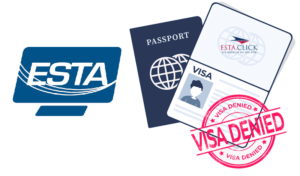The Electronic System for Travel Authorization (ESTA) has become an essential component for travelers visiting the United States. This web-based system determines the eligibility of individuals from Visa Waiver Program (VWP) countries to enter the US without a visa. However, it is disheartening to receive a notification of ESTA denial. Well, In this article, we delve into the common reasons behind ESTA denials, shedding light on the factors that may have led to your rejection. Whether you have faced a rejected ESTA, a denied ESTA, or an ESTA rejection, understanding these reasons can help you navigate the process more effectively.
We will also cover multiple topics:
- Understanding the Importance of ESTA Approval
- Common Reasons for ESTA Denial
- Addressing ESTA Denial and Seeking Alternatives
- Preventing ESTA Denial in Future Applications
Understanding the Importance of ESTA Approval
ESTA plays a pivotal role in assessing the eligibility of travelers from Visa Waiver Program (VWP) countries to enter the United States without a visa. It is a pre-screening process designed to ensure the safety and security of both visitors and the country. ESTA approval signifies that you meet the necessary requirements and have been granted permission to travel under the VWP.
Benefits of Having a Valid and Approved ESTA
- Effortless Entry Process: Holding an approved ESTA provides a streamlined and hassle-free entry experience. It eliminates the need for lengthy visa applications and interviews, saving you time and effort.
- Time and Cost Efficiency: Obtaining an ESTA is a cost-effective alternative to acquiring a visa. It allows you to travel to the US for up to 90 days for tourism, business, or transit purposes, without the expenses associated with a visa application.
- Flexibility for Multiple Entries: An approved ESTA grants you the freedom to visit the United States multiple times within a two-year period. This flexibility enables you to explore various destinations and engage in business activities without the need for repeated visa applications.
- Swift Authorization Process: ESTA Visa applications are typically processed swiftly, often within minutes. This rapid approval turnaround ensures that you can finalize your travel plans promptly and with confidence.
- Enhanced Travel Security: The ESTA evaluation process is designed to assess potential security risks and safeguard the United States. By obtaining an approved ESTA, you contribute to the overall safety of the country and its visitors.
Common Reasons for ESTA Rejection
The process of obtaining Electronic System for Travel Authorization (ESTA) approval is essential for travelers planning to visit the United States. However, it can be disheartening to receive a notification of ESTA denial. Understanding the common reasons behind these denials is crucial to improve your chances of approval in future applications. Let’s delve into the most frequently encountered factors that can lead to an ESTA denial:
Inaccurate or Incomplete Information
Providing inaccurate or incomplete information during the ESTA application process is one of the most common reasons for ESTA denial. It is crucial to double-check and verify all details before submitting your application. Even minor errors or omissions can raise concerns and result in an ESTA rejection. Ensure that your passport information, personal history, and travel plans are accurately filled out. Taking the time to review your application thoroughly can significantly increase your chances of approval.
Previous Visa or ESTA Denial
A history of visa or ESTA denials can have an impact on subsequent ESTA applications. US authorities consider an individual’s travel history, including previous denials, when evaluating an ESTA application. If you have faced a visa or ESTA denial reasons in the past, it is essential to address any underlying issues and provide strong justification for your new application. Clearly communicate any changes in circumstances or additional information that may help overcome the previous denials. Presenting a compelling case can increase your chances of obtaining an approved ESTA.
Travel or Citizenship Issues
Certain travel or citizenship issues can also lead to ESTA denial. Complexities associated with dual citizenship, Overstays and ESTA denial during previous visits to the US, or immigration violations can raise red flags and result in an ESTA rejection. It is crucial to address any potential concerns related to your travel or citizenship history. Provide necessary explanations, supporting documentation, or legal resolutions to demonstrate your eligibility for an approved ESTA. However, please keep in mind that ESTA approved but denied entry is still a possible scenario if you do not follow ESTA and US travel rules. Clear communication and transparency can help overcome these issues and improve your chances of a successful application.
Criminal History or Security Concerns
Having a criminal history or being associated with security concerns and ESTA denial can significantly impact your ESTA application. The US government prioritizes national security and may deny entry to individuals with previous convictions or involvement in activities of concern. If you have a criminal history, it is crucial to address the issue honestly and provide any relevant information, such as rehabilitation or legal resolutions. Demonstrating that you pose no threat to the safety and security of the United States can help mitigate concerns and increase your chances of obtaining an approved ESTA.

Addressing ESTA Denial and Seeking Alternatives
Receiving a notification of ESTA denial can be disheartening, but it’s essential not to lose hope. There are alternative routes and strategies you can explore to address the denial and fulfill your travel plans. Let’s delve into the steps you can take to overcome an ESTA denial reasons and seek alternative options:
Reviewing Denial Notice and Instructions
When faced with an ESTA denial, it is crucial to carefully review the denial notice and instructions provided. Understand the reasons cited for the denial and any specific guidance provided. Pay close attention to the information on how to address the denial and what steps to take next. Following these Instructions for addressing ESTA denial notice diligently can provide valuable insights into the underlying issues and help you determine the best course of action.
Applying for a B-1/B-2 Visa as an Alternative
If your ESTA application is denied, one alternative option is to apply for a B-1/B-2 visa. This type of visa allows for temporary business (B-1) or tourist (B-2) travel to the United States. Applying for a B-1/B-2 visa involves a different process and requirements compared to the ESTA USA. It may require an interview at the U.S. embassy or consulate in your home country. Research the specific requirements and gather the necessary documentation to support your visa application. Applying for a B-1/B-2 visa after ESTA denial can provide an alternative pathway to fulfill your travel plans.
Seeking Legal Advice or Waivers
In certain cases, seeking legal advice or Waivers for ESTA denial may be necessary to address specific ESTA denial reasons circumstances. Legal professionals experienced in immigration matters can provide guidance and assistance tailored to your situation. They can review your denial notice, assess the reasons behind it, and advise you on the best approach to resolve any issues. Additionally, they can help determine if you are eligible for a waiver or if there are any alternative options available to you. Seeking legal advice can provide valuable insights and increase your chances of finding a solution to overcome the ESTA denial.
Preventing ESTA Denial in Future Applications
Receiving an ESTA denial Reasons can be a setback for your travel plans, but it doesn’t mean you’re out of options. By understanding the reasons behind your denial and taking proactive steps, you can increase your chances of a successful ESTA application in the future. Let’s explore some strategies to prevent ESTA denial reasons in future applications:
Ensuring accuracy in ESTA applications and Completeness of Information
One of the most crucial factors in preventing ESTA denial is providing accurate and complete information. Take the time to review your application thoroughly before submitting it. Double-check all details, including passport information, personal history, and travel plans. Ensure that you enter information exactly as it appears on your passport. Even minor errors or omissions can lead to a denial. By paying attention to detail and verifying the accuracy of your application, you can minimize the risk of errors and increase your chances of approval.
Addressing Previous Issues or Denials
If you have faced previous issues or denials with your ESTA or visa applications, it is crucial to address and rectify them before reapplying. Take the time to understand the reasons behind the denials and make any necessary changes or improvements. Provide strong justifications and supporting documentation to demonstrate your eligibility and address any concerns raised in previous applications. Taking proactive steps to resolve any underlying issues or address previous denials can significantly improve your chances of a successful ESTA application in the future.

